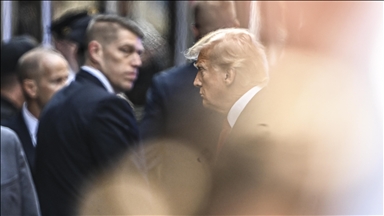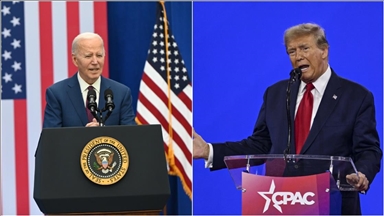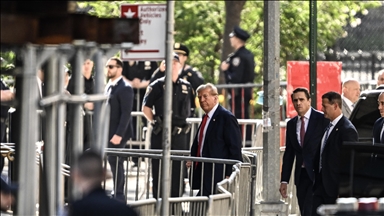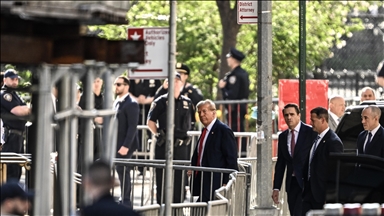ANALYSIS – Likely outcomes of Saudi Crown Prince's US visit
Muhammad Bin Salman's recent US trip has been much more successful in achieving Saudi Arabia’s security goals than its economic aspirations
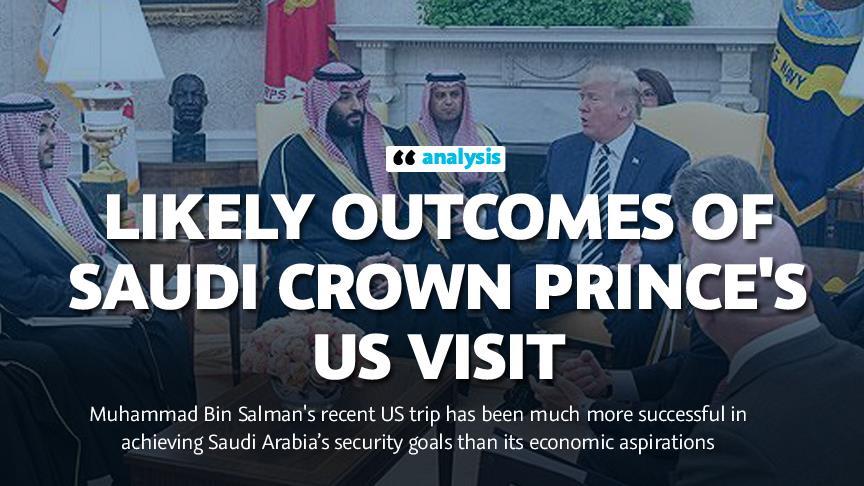
By Samuel Ramani

OXFORD
On March 19, Saudi Arabia’s Crown Prince Mohammed bin Salman made his first trip to the United States since his appointment as heir apparent by King Salman last June. During his visit, Mohammed bin Salman met with U.S. President Donald Trump, highlighted Saudi Arabia’s economic modernization initiatives
Mohammed bin Salman’s visit to the United States and efforts to rebrand Saudi Arabia’s image to the U.S. public have inspired polarizing reactions. Donald Trump’s effusive praise of the Saudi Crown Prince was countered by scathing criticisms by influential U.S. Senators, like Bernie Sanders and Mike Lee, of Riyadh’s conduct in Yemen and open displays of skepticism from U.S. business leaders about Saudi Arabia’s commitment to reform.
This polarization of opinion has caused Mohammed bin Salman’s U.S. trip to be more successful in achieving Saudi Arabia’s security goals than its economic aspirations. In the security sphere, Mohammed bin Salman has been able to achieve the two main goals of his agenda in the United States: securing long-term access to sophisticated U.S. military technology and hardening Saudi Arabia’s partnership with the United States against Iran.
Mohammed bin Salman’s objective of maintaining Saudi Arabia’s privileged position as a U.S. arms client hinged on his ability to convince the U.S. of the necessity of supporting Riyadh’s ongoing military campaign in Yemen. The U.S. Senate’s March 20 decision to strike down the Sanders-Lee bill calling for an end to American military assistance to Saudi Arabia’s Yemen intervention greatly boosted Mohammed bin Salman’s bargaining position ahead of his meetings with Trump and U.S. Secretary of Defense James Mattis.
After his meeting with Mohammed bin Salman, Trump openly called upon Saudi Arabia to purchase American
Trump’s praise of the strength of the U.S.-Saudi Arabia alliance has increased optimism in Riyadh that Saudi Arabia will be able to purchase Washington’s most sophisticated missile defense
Mohammed bin Salman’s hardline rhetoric against the threat Iran poses to regional stability has also gained a receptive ear in Washington. During his 60 Minutes interview, Mohammed bin Salman compared Iran’s belligerent activities in the Middle East to Nazi
This hardline anti-Iran rhetoric resonated strongly with U.S. officials, like incoming U.S. Secretary of State Mike Pompeo and National Security Advisor designate John Bolton, who
First, the Trump administration’s hardline anti-Iran policy increases the likelihood of Washington providing Saudi Arabia with nuclear energy assistance. In spite of long-standing concerns that providing civilian nuclear energy assistance to Saudi Arabia would give Riyadh the ability to produce nuclear weapons, the Trump administration’s efforts to strengthen the U.S.-Saudi Arabia alliance have caused Washington to downplay these nuclear proliferation concerns.
This shift in position was exemplified by U.S. Secretary of Energy Rick Perry’s recent statement that Washington should help Saudi Arabia develop its civilian nuclear program to ensure that Riyadh does not sign a nuclear deal with Russia or China. This statement was welcomed in Riyadh as a sign of convergence between the United States and Saudi Arabia on the nuclear energy issue after years of ambivalence, though Saudi officials still remain tight-lipped about the potential for a successful deal.
Second, the intensification of anti-Iran sentiments in Washington will likely allow Riyadh to carry out its military intervention against pro-Iran Houthi rebels in Yemen with impunity. The unwillingness of U.S. policymakers to pressure Saudi Arabia regarding the civilian costs of its military activities in Yemen was revealed in striking fashion by Trump’s decision not to discuss Yemen during his meeting with Mohammed bin Salman.
Trump’s avoidance of the Yemen issue contrasts markedly with his emphatic criticisms of the Saudi-led blockade in Yemen in December. This policy change is reflected in Washington’s broader attitude towards the Yemen crisis, as most senior Trump administration officials continue to view Saudi airstrikes in Yemen as a legitimate defensive response against Houthi missile launches on Saudi territory.
After his meeting with Mohammed bin Salman, Mattis appeared to counter this tacit acceptance of Saudi conduct in Yemen by calling for a swift end to the Yemen war and urging Saudi Arabia to be a part of the peace process. This rhetoric does not reflect a broader shift in U.S. policy towards Yemen, as Pompeo views Iran as the main driver of instability in Yemen, and remains committed to supporting Saudi Arabia’s military efforts.
Despite the considerable progress Mohammed bin Salman has made in strengthening the U.S.-Saudi Arabia security partnership, the Saudi Crown Prince has struggled to achieve similar positive results in the economic sphere. During his trip, Mohammed bin Salman has highlighted his Vision 2030 modernization program to U.S. defense and civilian industry leaders. The Vision 2030 plan calls upon Saudi Arabia to develop its own defense industry, and replace inefficient state-owned enterprises with dynamic private companies.
Mohammed bin Salman’s ability to convince U.S. business leaders of the viability of these economic reform proposals remains unclear. As Trump has extolled the economic benefits of exporting arms to Saudi Arabia, U.S. policymakers are likely to resist measures that reduce the kingdom’s dependence on U.S. weaponry. These sentiments could impact the opinions of U.S. defense contractors, and complicate Mohammed bin Salman’s efforts to promote Saudi military technology to leading U.S. defense companies.
U.S. business leaders also remain skeptical of Saudi Arabia’s commitment to privatization. While Saudi Arabia’s recent $19-billion stimulus package for small businesses was positively received in the United States, many U.S. business leaders believe that Mohammed bin Salman’s $300-billion privatization agenda can only be enacted if the Crown Prince cedes some political power.
There is also a great deal of skepticism in the United States about Mohammed bin Salman’s willingness to wean the Saudi economy off its reliance on subsidies, which is a reform that leading U.S. business institutions, such as S&P, believe is essential. These concerns could cause Mohammed bin Salman’s reform rhetoric to be met with a skeptical reception amongst U.S. business leaders, much like it was during the Crown Prince’s recent trip to the United Kingdom.
While Mohammed bin Salman’s arrival in the United States inspired a great deal of optimism in Saudi Arabia, his U.S. trip has been much more successful in achieving Saudi Arabia’s security goals than its economic aspirations. While these successes ensure that the U.S.-Saudi Arabia alliance will continue to strengthen, it remains to be seen whether Mohammed bin Salman can convince U.S. officials and business leaders that Saudi Arabia is on course for genuine political and economic change.
*Opinions expressed in this article are the author’s own and do not necessarily reflect the editorial policy of Anadolu Agency. Anadolu Agency website contains only a portion of the news stories offered to subscribers in the AA News Broadcasting System (HAS), and in summarized form. Please contact us for subscription options.


